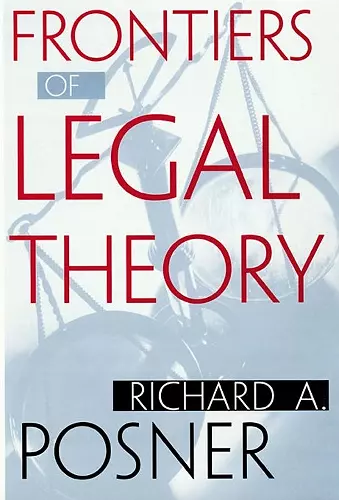Frontiers of Legal Theory
Format:Paperback
Publisher:Harvard University Press
Published:31st Mar '04
Currently unavailable, and unfortunately no date known when it will be back

The most exciting development in legal thinking since World War II has been the growth of interdisciplinary legal studies—the application of the social sciences and the humanities to law in the hope of making law less formalistic, more practical, better grounded empirically, bettered tailored to social goals. Judge Richard A. Posner has been a leader in this movement, and his new book explores its rapidly expanding frontier.
The book examines five principal areas or directions of interdisciplinary study: economics, history, psychology, the epistemology of law and the empirical study of law. These approaches are seen to interpenetrate and to compose a coherent body of legal theory—a unified framework for understanding such seemingly disparate phenomena as the economics of free speech, the intellectual history of economic analysis of law, the relation between income and liberty, the law of possession, the psychology of legal decisionmaking, the role of emotion in law, and the use of citation analysis to evaluate judges and law professors. The book carries on Posner’s project of analyzing the law as an institution of social governance.
[Posner’s] book provides an ‘external analysis’ of the law and immerses the reader in an incredible discourse of the application of economics, history, psychology and epistemology to a variety of legal subjects… The attentive reader will be fascinated, not only by the extraordinary depth of the discussion, but by the successful way this Renaissance judge has attempted to develop a more responsive legal system by using the fresh perspective of extra-legal disciplines. -- Ellen M. Heller * Baltimore Sun *
After somewhat controversial forays into the debates over Bill Clinton’s impeachment…and the 2000 presidential election…Judge Posner is back where he seems most comfortable, waxing at length over the relationship between legal theory and other academic disciplines including economics, psychology, history, and statistics… [H]is argument that legal practice itself should be treated as an academic discipline like any other is original, crisply explained, and should serve as fodder for future discussion. -- D. Yalof * Choice *
As both a federal judge and an author, Posner is well qualified to provide us with this timely overview of the leading trends currently guiding American legal thought. Promoting the concept of legal theory as a unified field of social science, the author delineates five areas for particular scrutiny: economics, history, psychology, epistemology, and quantitative empiricism. Posner cleverly argues for the transformation of the practice of law to an academic discipline by noting some of the inherent advantages… An empirical approach to the law can, the author claims, shed new light on issues such as campaign finance reform, free speech, and regulation of the Internet. -- Philip Y. Blue * Library Journal *
Posner offers insights into such controversial issues as hate crime legislation, controls over speech on the Internet, the costs and benefits of the jury system, and the standards for excluding categories of evidence from trial. [Posner’s] take on these issues is unfailingly original, crisply expressed and appropriately qualified by recognition of the limitations as well as the strengths of theory applied to real-world problems. * Publishers Weekly *
ISBN: 9780674013605
Dimensions: unknown
Weight: 653g
464 pages